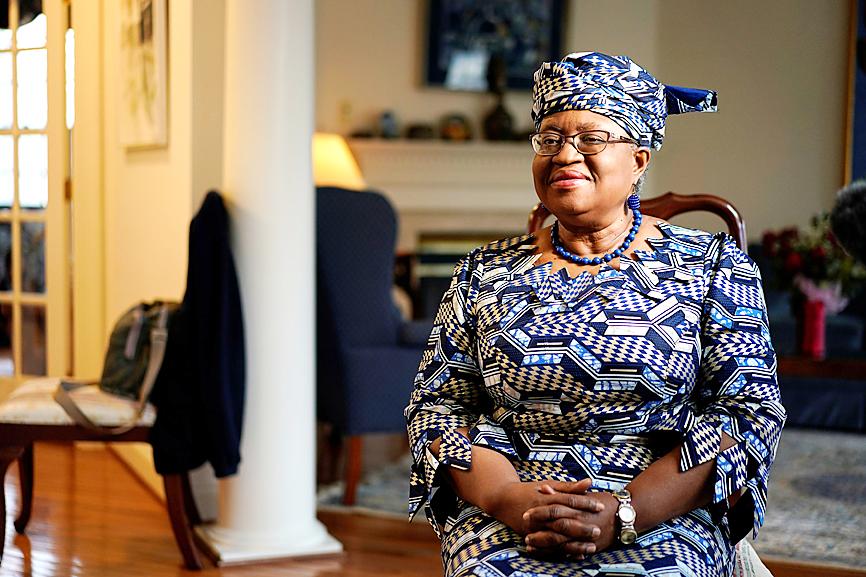Ngozi Okonjo-Iweala was on Monday chosen as the next director-general of the WTO, drawing praise from Taipei after the former Nigerian minister of finance promised fair treatment for Taiwan during her tenure.
When she takes office on March 1, she is to be the first woman and the first African to lead the multilateral trade body.
Before her appointment, Okonjo-Iweala maintained close communication with Taipei and the nation’s mission to the WTO, the Central News Agency reported yesterday.

Photo: Reuters
During discussions, she promised to treat Taiwan fairly as WTO leader, the agency said, citing a source familiar with the matter.
A self-declared “doer” with a track record of taking on seemingly intractable problems, Okonjo-Iweala is likely to have her work cut out for her at the trade body, even with former US president Donald Trump, who had threatened to pull the US out of the organization, no longer in the White House.
As director-general, a position that wields limited formal power, Okonjo-Iweala, 66, would need to broker international trade talks in the face of persistent US-China conflict; respond to pressure to reform trade rules; and counter protectionism heightened by the COVID-19 pandemic.
“What it [the WTO] needs is someone who has the capability to drive reform, who knows trade and who does not want to see business as usual, and that is me,” she said on Monday.
Earlier, she told Reuters that her top priority would be to ensure the trade body does more to address the COVID-19 pandemic.
She also expressed confidence that her priorities are aligned with Washington’s.
“I think our interests and priorities are aligned. They want to bring the WTO back to [its] purpose,” she said.
The US delegate said Washington was committed to working closely with her and would be a “constructive partner,” while China’s delegate pledged “full support” for her.
EU Commissioner for Trade Valdis Dombrovskis said he looked forward to working closely with her to drive “much-needed reform of the institution.”
A 25-year veteran of the World Bank, where she oversaw a US$81 billion portfolio, Okonjo-Iweala ran against seven other candidates by espousing a belief in trade’s ability to lift people out of poverty.
She studied development economics at Harvard after experiencing civil war in Nigeria as a teenager. She returned to the country in 2003 to serve as finance minister and backers point to her hard-nose negotiating skills that helped seal a deal to cancel billions of dollars of Nigerian debt with the Paris Club of creditor nations in 2005.
“She brings stature, she brings experience, a network and a temperament of trying to get things done, which is quite a welcome lot in my view,” former WTO director-general Pascal Lamy said last week. “I think she’s a good choice.”
Key to her success will be her ability to operate in the center of a “US-EU-China triangle,” he said.
The endorsement of US President Joe Biden’s administration cleared the last obstacle to her appointment.

AIR SUPPORT: The Ministry of National Defense thanked the US for the delivery, adding that it was an indicator of the White House’s commitment to the Taiwan Relations Act Deputy Minister of National Defense Po Horng-huei (柏鴻輝) and Representative to the US Alexander Yui on Friday attended a delivery ceremony for the first of Taiwan’s long-awaited 66 F-16C/D Block 70 jets at a Lockheed Martin Corp factory in Greenville, South Carolina. “We are so proud to be the global home of the F-16 and to support Taiwan’s air defense capabilities,” US Representative William Timmons wrote on X, alongside a photograph of Taiwanese and US officials at the event. The F-16C/D Block 70 jets Taiwan ordered have the same capabilities as aircraft that had been upgraded to F-16Vs. The batch of Lockheed Martin

GRIDLOCK: The National Fire Agency’s Special Search and Rescue team is on standby to travel to the countries to help out with the rescue effort A powerful earthquake rocked Myanmar and neighboring Thailand yesterday, killing at least three people in Bangkok and burying dozens when a high-rise building under construction collapsed. Footage shared on social media from Myanmar’s second-largest city showed widespread destruction, raising fears that many were trapped under the rubble or killed. The magnitude 7.7 earthquake, with an epicenter near Mandalay in Myanmar, struck at midday and was followed by a strong magnitude 6.4 aftershock. The extent of death, injury and destruction — especially in Myanmar, which is embroiled in a civil war and where information is tightly controlled at the best of times —

China's military today said it began joint army, navy and rocket force exercises around Taiwan to "serve as a stern warning and powerful deterrent against Taiwanese independence," calling President William Lai (賴清德) a "parasite." The exercises come after Lai called Beijing a "foreign hostile force" last month. More than 10 Chinese military ships approached close to Taiwan's 24 nautical mile (44.4km) contiguous zone this morning and Taiwan sent its own warships to respond, two senior Taiwanese officials said. Taiwan has not yet detected any live fire by the Chinese military so far, one of the officials said. The drills took place after US Secretary

THUGGISH BEHAVIOR: Encouraging people to report independence supporters is another intimidation tactic that threatens cross-strait peace, the state department said China setting up an online system for reporting “Taiwanese independence” advocates is an “irresponsible and reprehensible” act, a US government spokesperson said on Friday. “China’s call for private individuals to report on alleged ‘persecution or suppression’ by supposed ‘Taiwan independence henchmen and accomplices’ is irresponsible and reprehensible,” an unnamed US Department of State spokesperson told the Central News Agency in an e-mail. The move is part of Beijing’s “intimidation campaign” against Taiwan and its supporters, and is “threatening free speech around the world, destabilizing the Indo-Pacific region, and deliberately eroding the cross-strait status quo,” the spokesperson said. The Chinese Communist Party’s “threats